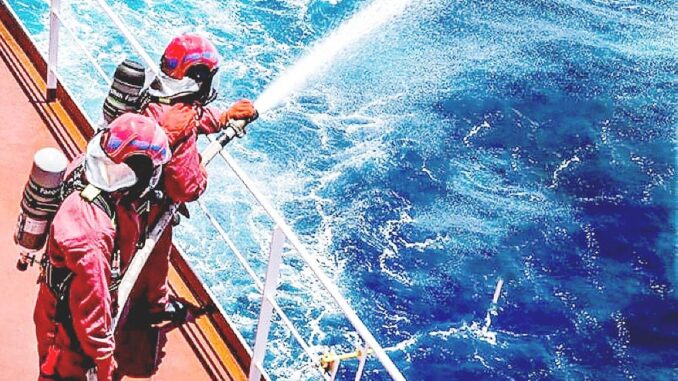
It was a tumultuos year for the Philippine maritime industry, marked by the passage of the controversial Magna Carta of Filipino Seafarers.
This landmark legislation, the culmination of a protracted battle involving diverse stakeholders and complex legislative process, has ushered in a new era for Filipino seafarers, amid uncertainty and challenges.
Republic Act (RA) 12021 or An Act Providing for the Magna Carta of Filipino Seafarers establishes comprehensive protection for seafarers both at sea and onshore, ensuring they receive fair compensation, adequate training, and access to social and welfare benefits.
Key provisions of the law include mandatory shipboard training, fair treatment in the event of illness or injury, and strict regulations to prevent ambulance-chasing among others.
The industry is expected to release the law’s implementing rules and regulations (IRR) within 90 days upon signing by President Ferdinand Marcos Jr. last Sept. 23.
But 86 days into the deadline, how close is the industry to coming up with a comprehensive and all-inclusive IRR? According to veteran ship captain and president of Navigator International Maritime Training and Assessment Center Inc. Edgardo Flores, the Magna Carta of Seafarers’ IRR may take longer to finish “because of the numerous unsettled issues that stakeholders have yet to agree upon.”
Flores said that while the law has significant impact on the industry and its stakeholders, it is apparent that about 80 percent of Filipino seafarers are ill-informed of its contents and interpretation.
This observation was echoed by Gaudencio Morales, president of Integrated Seafarers of the Philippines (ISP) and IMP Shiptard.
“There are a few provisions in the law which may be confusing. It is necessary to rectify these in the IRR,” he said. Michael Estaniel, head of Trans-Global shipping and member of the Filipino Association for Mariners Employment (FAME), contends that the Magna Carta, while intended to protect seafarers, has inadvertently hindered the industry’s competitiveness.
Some key challenges that he mentioned include are
high labor costs due to the MC make Philippine manning companies less competitive globally;
complex regulations and slow processes impede efficient operations;
inconsistent enforcement and a lack of industry expertise within regulatory agencies create uncertainty.
The maritime education system also faces challenges in providing skilled seafarers due to limited resources and outdated training methods, he said.
These issues, he added, requires reform, such as balancing seafarer protection with industry needs, regulatory streamlining: Simplifying processes and improving efficiency.
He said that by addressing these challenges, the Philippines can revitalize its position in the global maritime industry. Among the controversial provisions in the Magna Carta is the possible transfer of the supervision of maritime education to the Maritime Industry Authority (Marina); the posting of a bond by seafarers with regards to ambulatory cases, of which it will be reimbursed only if the seafarer wins the case; and the mandated remittance of at least 80 percent of the seafarer’s monthly wages to his appointed allottee.
Meanwhile, Marina Administrator Sonia Malaluan remained positive with the ongoing legal review of the Magna Carta’s IRR. It reached its second legal review last December 6 by the Department of Migrant Workers (DMW) and Marina.
“While the review process is not yet fully completed, I am pleased to note that significant progress has been made. With the active participation of relevant government agencies, manning and maritime associations, seafarers’ unions, and other stakeholders, we have successfully reviewed the entire draft IRR,” Malaluan said.
“Substantive recommendations were made and thoughtfully considered, and many of which have already been adopted,” she added.
“The Magna Carta of Filipino Seafarers is a win-win solution in the current issues and concerns in the seafaring industry,” said Morales.
“If we implement the Seafarers’ Magna Carta as envisioned by both houses of Congress, there is no doubt that it will lead to a significant increase in job opportunities for Filipino seafarers. This landmark legislation will address systemic challenges and ensures that Filipino seafarers are not only protected but also empowered to thrive in an evolving global shipping industry,” Iris Baguilat, chairman of the Association of Licensed Manning Agencies (Alma) Maritime Group, said.
“The Magna Carta of Filipino Seafarers is undoubtedly one of the most important milestones for the maritime sector this year. It codifies the rights and welfare of Filipino seafarers, aligning domestic policies with international conventions such as the Maritime Labor Convention (MLC) 2006 and the STCW Convention. Beyond securing protections for seafarers, it also provides clear mechanisms to address industry challenges, such as ambulance-chasing, which has long plagued seafarers and shipowners alike,” House Committee on Overseas Workers Affairs chair and Kabayan Party-list Rep. Ron Salo, stated.
He added that the law was drafted to restore the confidence among international shipping companies in employing Filipino seafarers “by ensuring compliance with international standards and having measures to address ambulance-chasing.”
For the biggest seafarer union in the Philippines, the Associated Marine Officers and Seamen’s Union of the Philippines (Amosup), and through its president Dr. Conrado Oca, the passing of the Magna Carta of Filipino Seafarers into law is an important victory for all Filipino seafarers serving onboard both domestic and international vessels, as it seeks to ensure our country’s compliance with the Maritime Labor Convention 2006 that protects the rights and promotes the welfare of all seafarers and encompasses comprehensive safeguards to uphold their rights to decent, just, and gainful employment.


Be the first to comment